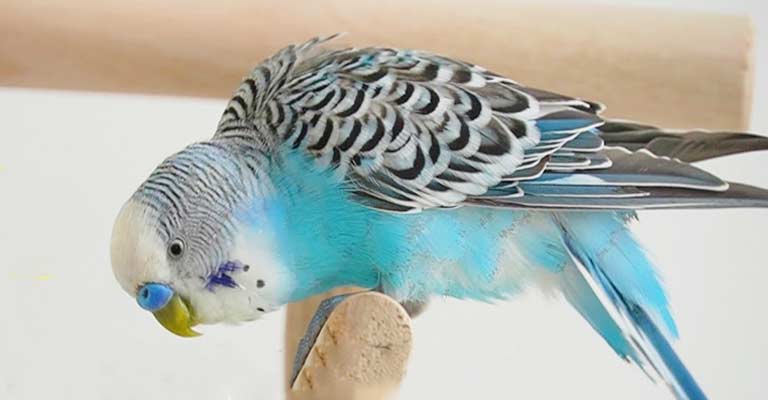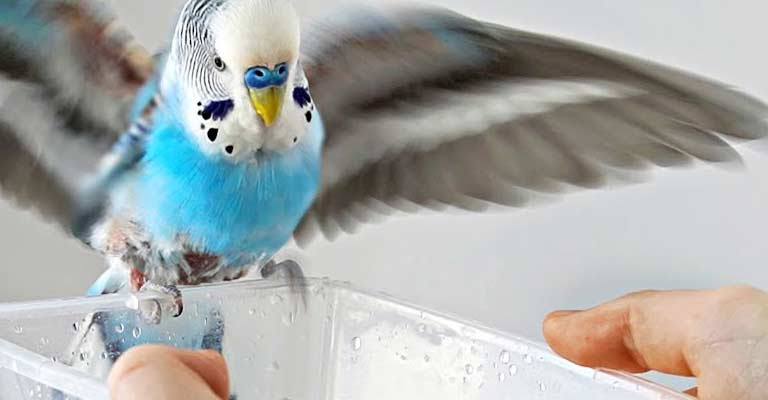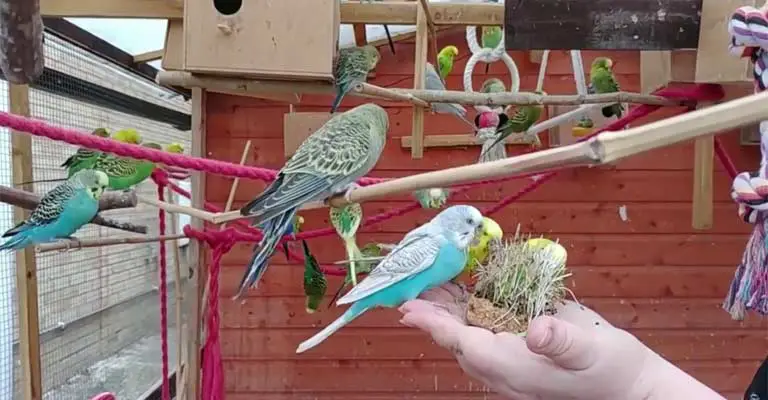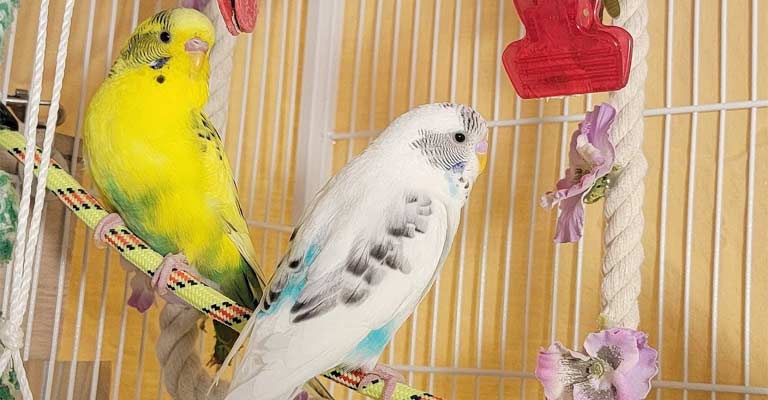The well-being of a pet parakeet is a paramount concern for devoted bird owners, prompting questions about their eating habits and potential self-imposed starvation.
While it is uncommon for parakeets to intentionally starve themselves, various factors can contribute to a decreased appetite, raising concerns among caregivers.
This exploration delves into will a Parakeet starve itself, addressing the possibility of self-imposed starvation and the reasons behind such occurrences.
Understanding these dynamics is crucial for providing optimal care, ensuring a harmonious relationship between bird and owner, and promoting the overall health and happiness of these delightful avian companions.

Will A Parakeet Starve Itself?
Parakeets, like many birds, can exhibit stubborn behaviours, and while it’s uncommon for them to intentionally starve themselves, they may refuse to eat for various reasons.
Stress, changes in environment, illness, or even diet preferences can contribute to a parakeet’s reluctance to eat. These birds are sensitive to disruptions, and if they perceive a threat or discomfort, they might temporarily resist food.
However, prolonged fasting is a serious concern and can lead to malnutrition and health issues. Owners must monitor their parakeet’s eating habits closely and seek veterinary assistance if the bird continues to show aversion to food for an extended period.
Understanding the potential causes and addressing them promptly is essential to ensure the well-being of the parakeet.
Why Do Parakeets Starve Itself?

Understanding why a parakeet might exhibit self-imposed starvation is crucial for responsible pet ownership. While it’s not common for parakeets to intentionally starve themselves, several factors can contribute to a decrease in appetite.
Here are some potential reasons why a parakeet may engage in such behaviour.
Stress and Anxiety
Parakeets are highly sensitive birds, and stress or anxiety, often triggered by changes in their environment, can lead to a reduced appetite. New surroundings, loud noises, or the presence of unfamiliar people or pets can induce stress.
Illness or Pain
Underlying health issues, pain, or discomfort can significantly impact a parakeet’s appetite. If they associate eating with pain, they may refuse food. Regular veterinary check-ups are essential to identify and address health concerns.
Diet Preferences
Parakeets can be selective eaters, and a sudden change in their diet or the introduction of unfamiliar foods may lead to decreased food consumption. Offering a varied and balanced diet is crucial to cater to their preferences.
Change in Routine
Parakeets thrive on routine, and disruptions can affect their eating habits. Changes in feeding times or alterations to their daily schedule may initially cause reluctance to eat.
Molting Period
During moulting, parakeets may experience discomfort, leading to a temporary decrease in appetite. Providing soft foods and ensuring they are comfortable can help support them through this natural process.
Environmental Factors
Extreme temperatures, drafts, or an uncomfortable cage setup can influence a parakeet’s eating behaviour. Maintaining a comfortable and safe environment is crucial for their overall well-being.
Psychological Issues
Parakeets can develop psychological issues that affect their appetite, such as depression or boredom. Ensuring a stimulating and enriched environment with toys, social interaction, and mental challenges is essential.
How Long Can A Parakeet Starve Itself?

The duration a parakeet can go without eating varies based on several factors, including its age, health, and overall well-being. While parakeets are resilient birds, prolonged self-imposed starvation can have severe consequences.
In general, a healthy parakeet may survive without food for a few days, but beyond that, the risk of malnutrition, organ failure, and other health complications increases significantly.
Bird owners must monitor their parakeets closely and seek immediate veterinary attention if the bird shows signs of prolonged fasting.
Identifying and addressing the underlying cause of starvation is paramount to ensure the parakeet’s health and prevent long-term damage.
Early intervention and a thorough understanding of the bird’s behaviour are essential for providing the necessary care and support to encourage a return to regular eating habits.
How Do I Know If My Parakeet Is Starving Itself?

Recognizing signs of a parakeet starving itself is crucial for early intervention and proper care. Parakeets, like many birds, may exhibit subtle behaviours indicative of decreased appetite or potential health issues.
Here are some acts that may signal that your parakeet is struggling with self-imposed starvation:
Refusal to Eat
The most apparent sign is a sudden and consistent refusal to eat. If your parakeet consistently avoids its food, it raises concerns about potential starvation.
Weight Loss
A noticeable decrease in body weight is a clear indication of insufficient food intake. Regularly monitor your parakeet’s weight to detect changes early on.
Lethargy and Weakness
Starvation can lead to lethargy and weakness. If your parakeet appears unusually inactive, struggles to perch, or has difficulty flying, it may be a sign of nutritional deficiency.
Reduced Dropping Output
Changes in droppings, such as a decrease in frequency or alterations in colour and consistency, can indicate nutritional imbalances resulting from insufficient food consumption.
Changes in Feeding Habits
A parakeet that once eagerly approached its food but now shows disinterest or hesitation may be signalling a reluctance to eat. Observe any changes in feeding behaviour for potential red flags.
Beak and Toe Changes
Malnutrition can manifest in physical changes, including changes to the beak or toes. A parakeet may develop overgrown beaks or exhibit abnormalities in the texture and colour of the feet.
Decreased Vocalization
A reduction in vocalizations or the absence of happy chirping and talking may indicate discomfort or distress related to starvation. Parakeets are naturally social birds, so any sudden change in vocal behaviour is noteworthy.
If you observe any of these signs, it’s crucial to consult with an avian veterinarian promptly. Early detection and intervention can be pivotal in addressing the underlying causes of self-imposed starvation and ensuring the well-being of your feathered companion.
FAQs
What are common reasons for a parakeet to stop eating?
Factors like stress, environmental changes, illness, or diet preferences can contribute to a parakeet’s decreased appetite. Identifying the specific cause is essential for proper care.
How long can a parakeet go without eating before it’s a concern?
While they can survive a few days without food, prolonged fasting poses serious health risks. Any signs of decreased appetite should prompt immediate attention from a vet.
What signs indicate a parakeet is starving itself?
Refusal to eat, weight loss, lethargy, changes in droppings, altered feeding habits, and decreased vocalization are indicative of a parakeet struggling with self-imposed starvation.
Can stress cause a parakeet to starve itself?
Yes, stress is a common factor leading to decreased appetite in parakeets. Changes in their environment, loud noises, or disruptions can contribute to stress-related fasting.
What should I do if my parakeet stops eating?
Consult with an avian veterinarian promptly. Identifying and addressing the underlying cause, whether stress, illness, or diet issues, is crucial for the parakeet’s well-being.
Conclusion
In the intricate world of avian care, the question of whether a parakeet will starve itself prompts a nuanced examination of their behaviours and needs.
While self-imposed starvation is not a typical behaviour, the health and well-being of parakeets can be influenced by a range of factors, from stress and diet preferences to underlying health issues.
As responsible caregivers, it is imperative to remain vigilant, monitor their eating habits closely, and seek professional advice if signs of persistent or concerning changes in appetite arise.
By addressing potential causes promptly, we contribute to the welfare of our feathered friends, ensuring they lead happy, healthy lives in our care.